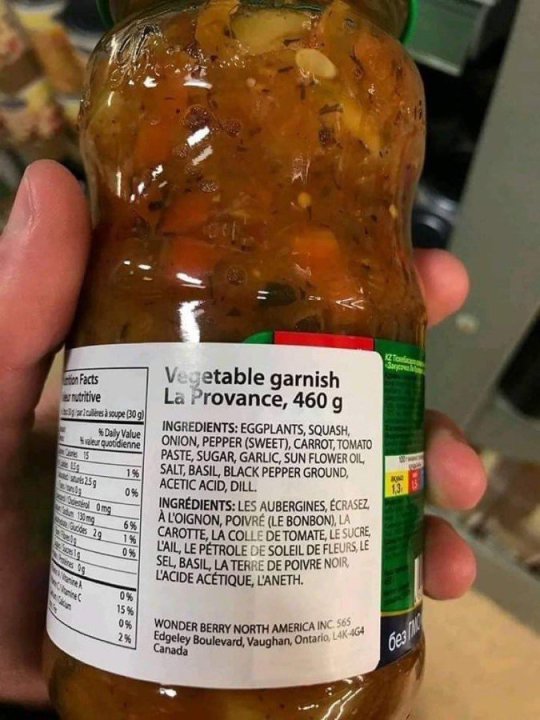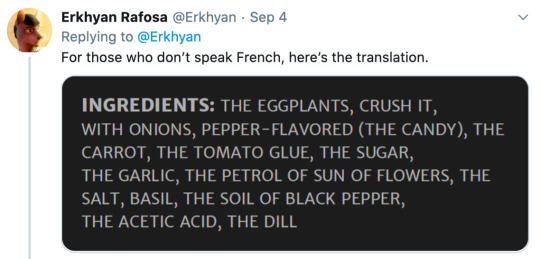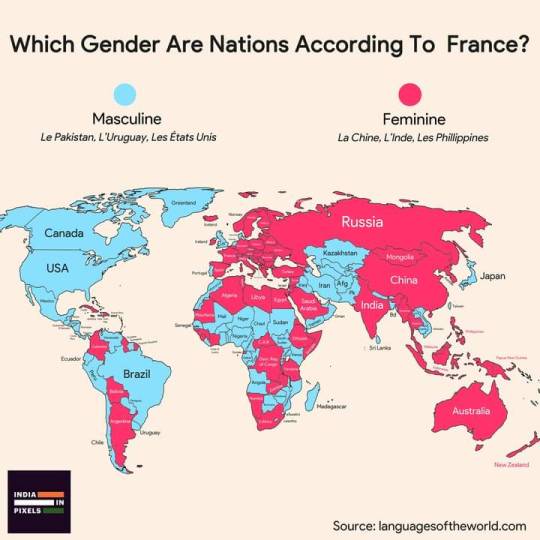Photo

I just learned that the Russian word for “ladybug” translates to “God’s Little Cow”
165K notes
·
View notes
Text
news documentary channels in french on youtube
hi everyone! recently i've been listening to news documentaries for listening practice. the language is understandable and it exposes you to a bunch of different topics. i'll update the list as i find more!
arte: on the shorter side in comparison with the videos from the other channels, varied reporting on lots of different topics, but i'm especially a fan of the episodes about social media and the internet.
food story: exactly what it sounds like, documentaries about food, how it's made, restaurants, etc.
750g tv: this one is similar to food story, in case you want more varied options.
ailleurs - reportages voyages: travel and tourism, in a lot of their videos they go to french communities in other countries to see why they moved to that place, what they are doing in the local community, etc.
a decouvert: this channel is about finances and the economy, but for some reason i really like their videos on how supermarkets run.
reportages et investigations: this channel isn't as specialized as the others, but as a result has a large variety of topics to choose from.
if you know of any others, send them my way and i'll check them out and add them to the list!
315 notes
·
View notes
Photo
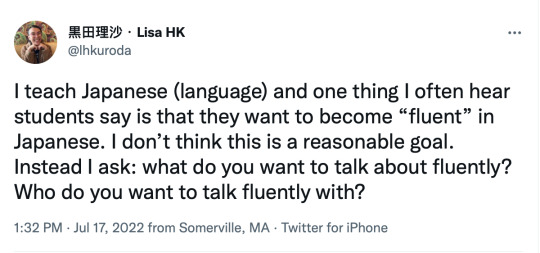
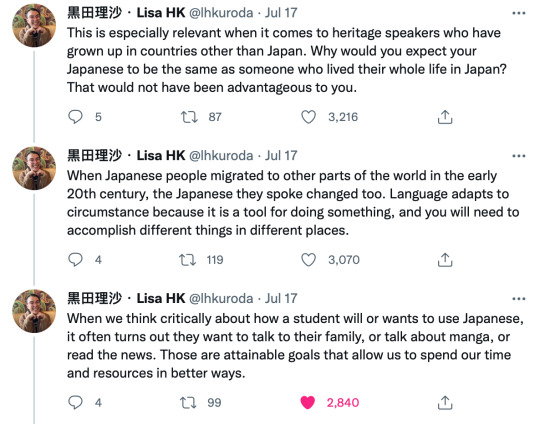

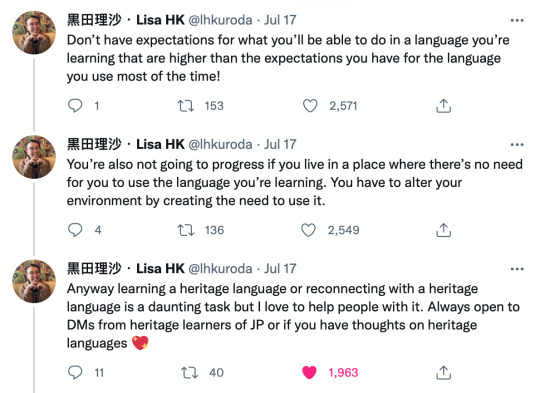
This Twitter thread really spoke to me. I wanted to share it with anyone who hasn’t seen it.
24K notes
·
View notes
Text
Duolingo Sucks, Now What?: A Guide
Now that the quality of Duolingo has fallen (even more) due to AI and people are more willing to make the jump here are just some alternative apps and what languages they have:
"I just want an identical experience to DL"
Busuu (Languages: Spanish, Japanese, French, English, German, Dutch, Italian, Portuguese, Chinese, Polish, Turkish, Russian, Arabic, Korean)
"I want a good audio-based app"
Language Transfer (Languages: French, Swahili, Italian, Greek, German, Turkish, Arabic, Spanish, English for Spanish Speakers)
"I want a good audio-based app and money's no object"
Pimsleur (Literally so many languages)
Glossika (Also a lot of languages, but minority languages are free)
*anecdote: I borrowed my brother's Japanese Pimsleur CD as a kid and I still remember how to say the weather is nice over a decade later. You can find the CDs at libraries and "other" places I'm sure.
"I have a pretty neat library card"
Mango (Languages: So many and the endangered/Indigenous courses are free even if you don't have a library that has a partnership with Mango)
"I want SRS flashcards and have an android"
AnkiDroid: (Theoretically all languages, pre-made decks can be found easily)
"I want SRS flashcards and I have an iphone"
AnkiApp: It's almost as good as AnkiDroid and free compared to the official Anki app for iphone
"I don't mind ads and just want to learn Korean"
lingory
"I want an app made for Mandarin that's BETTER than DL and has multiple languages to learn Mandarin in"
ChineseSkill (You can use their older version of the course for free)
"I don't like any of these apps you mentioned already, give me one more"
Bunpo: (Languages: Japanese, Spanish, French, German, Korean, and Mandarin)
69K notes
·
View notes
Text
134 notes
·
View notes
Text
Here is a (non-exhaustive) list of free resources for different sign languages:
American Sign Language (ASL)
Australian Sign Language (Auslan)
Australian Indigenous Sign Languages
Black American Sign Language (BASL)
Brazilian Sign Language (LSB)
British Sign Language (BSL)
Chinese Sign Language (CSL)
Emirati Sign Language (ESL)
French Sign Language (LSF)
Italian Sign Language (LIS)
Indian Sign Language (ISL)
International Sign Language (IS)
Irish Sign Language (ISL)
Japanese Sign Language (JSL)
New Zealand Sign Language (NZSL)
Mexican Sign Language (LSM)
Plains Indian Sign Language (PISL)
Polish Sign Language (PJM)
Ukrainian Sign Language (USL)
Yolŋu Sign Language (YSL)
Please feel free to add on if you know of others, be it more resource for one of the sign languages above, or resources for learning any of the other 300 plus sign languages.
Edit: I updated the ASL reference to Bill Vicars, but reminder that these are just things I found around, please find Deaf teachers wherever possible! And for ASL, lifeprint.com is another wonderful resource.
24K notes
·
View notes
Text
I love the term “loanwords” because it implies that you intend to give them back.
75K notes
·
View notes
Text
Grand + vowel
Grand (Big, tall, growing) is the masculine singular adjective related to Grandeur. When followed by a consonant, you don't pronounce it: Un gran(d) lit. But when followed by a vowel (or an -h, which is necessarily be followed by a vowel), instead of making a -d- liaison, you actually have to turn it into a T.
This phenomenon is called an articulatory relaxation (Un relâchement articulatoire) which is when a letter is naturally turned into another one easier to pronounce. Here we have an "amuïssement", the disappearance, muting of a sound, from a voiced (sonore) final consonant to an unvoiced (sourde) final consonant.
A few typical examples:
Le grand amour - True love
Un grand homme - A great man
Un grand artiste/auteur - A great artist/writer
Grand Hôtel
Grand-Est (train station)
The same process exists the other way around, which is why Neuf (Nine) can turn into Neuvième (Ninth) or any French determiner ending in a -s (Les, Trois) followed by a vowel triggers a -z- liaison: Des enfants > Dé-z-enfan.
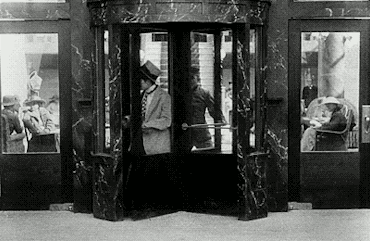
150 notes
·
View notes
Text
Le passé simple
The passé simple is a literary tense that is used to mark a brief action that occurs once. It’s equivalent in speaking is the passé composé. It is slowly falling out of use, especially the nous and vous conjugations, but it’s still important to learn because a lot of books use it.
Passé simple en a
This conjugation applies to the verbs from the first group (ending in -er) as well as aller
Je: -ai, aimai
Tu: -as, aimas
Il/elle: -a, aima
Nous: -âmes, aimâmes
Vous: -âtes, aimâtes
Ils/elles: -èrent, aimèrent
Passé simple en i
This conjugation applies to the verbs from the second group (ending in -ir) as well as some verbs from the third group (irregular verbs)
Je: -is, finis
Tu: -is, finis
Il/elle: -it, finit
Nous: -îmes, finîmes
Vous: -îtes, finîtes
Ils/elles: -irent, finirent
Passé simple en u
This applies to the remaining verbs from the third group (irregular verbs)
Je: -us, courus
Tu: -us, courus
Il/elle: -ut, courut
Nous: -ûmes, courûmes
Vous: -ûtes, courûtes
Ils/elles: -urent, coururent
Passé simple pour tenir/venir
This applies only to the verbs tenir and venir
Je: -ins, tins/vins
Tu: -ins, tins/vins
Il/elle: - int, tint/vint
Nous: -înmes, tînmes/vînmes
Vous: -întes, tîntes/vîntes
Ils/elles: -inrent, tinrent/vinrent
Unfortunately there is no simple rule allowing us to know when a verb in the third group uses the conjugation with i or with u. The verbs using the conjugation with u must be memorized. Here are some:
Courir
Vouloir
Connaître
Savoir
Pouvoir
Boire
Croire*
Croître*
Valoir
Vivre
Plaire
Taire
Résoudre
*In order to avoid mixing up croire and croître, croître keeps its accent circonflexe (^) at all times (croire only uses it for the nous and vous conjugations)
579 notes
·
View notes
Text
sich etwas hinter die Ohren schreiben
literally: to write oneself something behind one's ears
to remember something important very well
Our ancestors used to make their children witness important events and gave them a slap on the back of the ear so that they could remember the event better and pass the knowledge on to later generations.
30 notes
·
View notes
Text
A little German text style guide
Here are some rules about how to use quotation marks, dates, times, numbers, and addresses in German texts:
Quotation marks:
Quotation marks in German texts usually look like this:
„Hallo, ich heiße Espen.“
„Ich glaube nicht“, sagte er, „aber ich bin mir nicht sicher.“
Er sagte: „Ich habe einen Apfel gegessen.“
Date:
The date is written in the form day/month/year, usually like this:
am 3. August 2023 (read: "am dritten August 2023")
am 03.08.2023 (read: "am dritten August 2023")
Time:
The time is usually stated in a 24 hour format (otherwise you add 'in the morning' or 'in the evening' to clarify):
Es ist 18:40 Uhr. (read: "Es ist 18 Uhr 40")
Es ist 4 Uhr nachmittags.
Numbers:
The points and commas in numbers look like this:
eleven thousand = 11.000 (e.g. 11.000 Maschinen)
eleven point three = 11,3 (e.g. 11,3% Umsatz)
Address:
Addresses on letters are usually written like this:
Max Mustermann (first & last name)
Musterstraße 11 (street name & house number)
12345 Musterstadt (postcode & city)
Germany (country)
384 notes
·
View notes
Text
Quelques mots et phrases québécois et leur équivalents français

il fait frette = il fait froid
du change = de la monnaie
piastre = dollar
dispendieux = très cher
cash = comptant
comme du monde = normalement = comme cela doit se faire
s'exciter = s'énerver
jaser = bavarder
maganer = casser = briser
en masse = extrêmement = beaucoup
pas pire = pas mal
la liqueur = le soda
un breuvage = une boisson
bienvenue = de rien
le gaz = l'essence
le char = la voiture
full = plein
bon matin = bonjour
allô = salut
à tantôt = à plus tard
fait que = donc = alors
à date = jusqu'à maintenant
un bec = un bisou
achaler = déranger
chauffer son char = conduire sa voiture
chauffeur = conducteur
avoir du fun = avoir du plaisir
parker = stationner
la valise = coffre arrière de l'auto
un camion = un pick-up
tu es dans le champ = tu te trompes totalement
avoir de la misère = avoir des difficultés
blonde = copine
chum = copain
295 notes
·
View notes
Text
Le français québécois
1. Les particularités du français québécois

[source]
Prononciation:
le maintien des voyelles longues: une différence entre fête [fɛ :t] et fait [fɛt]
ouverture des voyelles i, u, ou
affircation des consonnes t et de suivies des graphèmes i et u–> tu sais devient [tsy], d devient [dz]
le maintien du son [oe] pour le graphème un: Distinction entre les voyelles : [ɛ] et [oe]: e.g. un brin brun [oe.bʁe.bʁoe] et dans la paire minimale emprunte [a.pʁoet] et empreinte [a.pʁet]
t muet en finale de mot est prononcé [t] –>tout [tut]
les pronoms sont prononcés différemment: elle–> a, elles/ils –>i, addition/ remplacement: Eux ils sont heureux –>Eux autres i’ sont heureuxVous, viendrez-vous ? –>Vous autres, viendrez-vous ?
… et beaucoup d’autres
Le lexique:
amériandinismes (e.g. Québec veut dire où la rivière devient étroite)
archaismes (e.g char pour voiture)
anglicismes (checker de to check pour vérifier)
francisismes (fin de semaine pour le weekend)
Autres particularités:
Connecteurs:
pi (de puis) est utilisé comme coordination, conséquence, addition –>Toi pi moi, on fait une bonne équipe.
faque ( vient de ca fait que): introduit une conséquence –> Je regardais pas où je marchais, faque je suis tombé
Mots du discours: comme dis don, voyons, coudon–> Coudon ! T’es encore couché !
Structure de l’interrogation: Ca va-tu? Pierre i’est-tu parti hier?
Watch this video describing more caracteristics:
youtube
2. La situation linguistique au Québec
2.1. L’histoire
début du 17ième siècle: les Francais ont commencé à coloniser le Canada, après le départ de France le Québec est devenu britannique en 1763
–>anglais était la langue dominante, les contacts avec la France sont devenus rares –>un écart entre le Francais de France et le Francais de Québec
2.2 Les lois linguistiques et la domination d’anglais
à partir des années 1960 : premières études sur les attitudes linguistiques
–>résultats: le francais était au voie de disparition à cause de: 1. la domination de l’anglais, 2. les immigrés au Québec ont appris l’anglais et pas le francais
de plus: écarte très grande entre les francophones et anglophones au Québec en ce qui concerne le monde de travail
-nécessité des lois linguistiques pour maintenir le francais:
La loi 101 : charte de la langue française 1977 : l’affirmation de la primauté du français au travail et sur la place publique, elle n’admettait plus la coexistence avec l’anglais dans plusieurs domaines que la Loi 22 rendait encore possible, elle a restreint encore plus l’accès à l’école anglaise pour les immigrants
-loi 86 : affichage dans les deux langues, pourvu que le français soit dominant
Office québécois de la langue française: crée en 1961 : mandat général : améliorer la qualité de la langue au Québec
[et d’autres]
2.3. Les problèmes aujourd’hui
encore aujourd’hui il existe une insécurité linguistique parmi les Québécois envers l’anglais, mais surtout aussi envers le Francais de France: ils regardent le Francais de France comme seul variété légitime
–>dans le futur: le but est de créer un standard pluricentrique avec des variétés du francais, comme on peut voir avec l’anglais et l’espagnol.
[sources: Le francais québécois d’aujourd’hui - Luc Ostiguy, Kristin Reinke,
Bigot Davy, Papen Robert A, « Sur la « norme » du français oral au Québec (et au Canada en général) »
Szlezák, Edith (2015). « Prestige et stigmatisation dans les variétés du français. » Zeitschrift für Kanada-Studien vol. 35. 8-24.
Kircher, Ruth (2014). “Thirty Years After Bill 101: A Contemporary Perspective on Attitudes Towards English and French in Montreal.” Canadian Journal of Applied Linguistics, vol. 17, no.1. 20-50.
Auger, Julie (2005). « Un bastion francophone en amérique du nord - le québec. » Le francais en Amérique du Nord, ed. by Valdman et al. 39-79.]
This is just an overview of a few interesting points about Québec and the linguistic situation there. This does not want to present a complete list. Let me know if there are any mistakes!
176 notes
·
View notes
Photo

Overview:
Forvo Pronunciation Dictionary
Language Info
Wikipedia
Grammar & Courses:
iLanguage Tamil
Learn101 Tamil
Learn to Read Tamil
Linguanaut Tamil
Memrise Courses
MyLanguages Tamil
Parlemo Tamil
Polymath Tamil
Tamil Language in Context
UT Austin Tamil Script
Dictionaries:
tamildict
Tamil Dictionary
Books:
A Generative Grammar of Tamil
A Grammar of Modern Tamil
An Intensive Course in Tamil
A Reference Grammar of Spoken Tamil
Assimil Tamil
Colloquial Tamil + Audio
Learning Tamil By Yourself
The Tamil Case System
Media:
BBC Tamil
Mango Languages
SBS Tamil
SLBC
Tamil Newspapers
Video Lessons
471 notes
·
View notes

